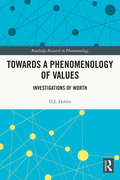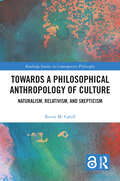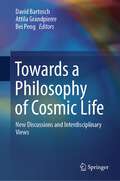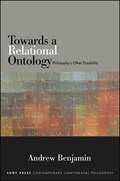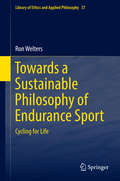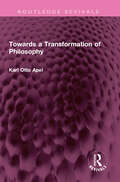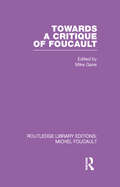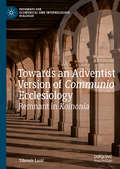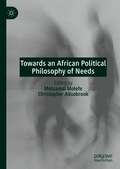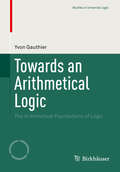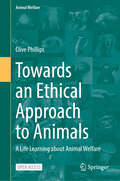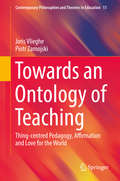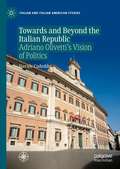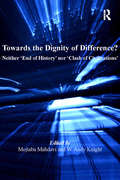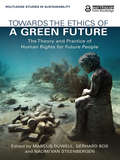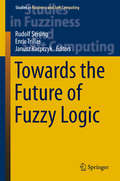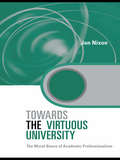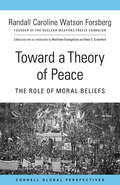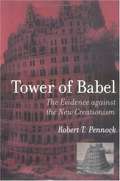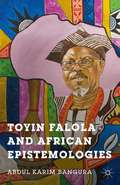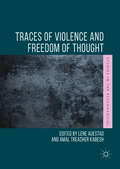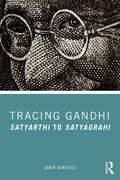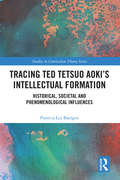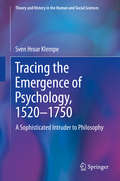- Table View
- List View
Towards a Phenomenology of Values: Investigations of Worth (Routledge Research in Phenomenology)
by D.J. HobbsThis book provides a framework for phenomenological axiology. It offers a novel account of the existence and nature of values as they appear in conscious experience. By building on previous approaches, including those of Edmund Husserl, Max Scheler, and Nicolai Hartmann, the author develops a unique account of what values really are. After explicating and defending this account, he applies it to several of the most difficult questions in axiology: for example, how our experiences of value can differ from those of others without reducing values to subjective judgments or how the values we experience are connected to the volitional acts that they inspire. This provides satisfactory answers to certain fundamental questions concerning the basic structure of value-experiences. Accordingly, this book represents a novel step forward in phenomenological axiology. Towards a Phenomenology of Values will be of interest to scholars and advanced students working in phenomenology and value theory.
Towards a Philosophical Anthropology of Culture: Naturalism, Relativism, and Skepticism (Routledge Studies in Contemporary Philosophy)
by Kevin M. CahillThis book explores the question of what it means to be a human being through sustained and original analyses of three important philosophical topics: relativism, skepticism, and naturalism in the social sciences. Kevin Cahill’s approach involves an original employment of historical and ethnographic material that is both conceptual and empirical in order to address relevant philosophical issues. Specifically, while Cahill avoids interpretative debates, he develops an approach to philosophical critique based on Cora Diamond’s and James Conant’s work on the early Wittgenstein. This makes possible the use of a concept of culture that avoids the dogmatism that not only typifies traditional metaphysics but also frequently mars arguments from ordinary language or phenomenology. This is especially crucial for the third part of the book, which involves a cultural-historical critique of the ontology of the self in Stanley Cavell’s work on skepticism. In pursuing this strategy, the book also mounts a novel and timely defense of the interpretivist tradition in the philosophy of the social sciences. Towards a Philosophical Anthropology of Culture will be of interest to researchers working on the philosophy of the social sciences, Wittgenstein, and philosophical anthropology.
Towards a Philosophical Anthropology of Culture: Naturalism, Relativism, and Skepticism (Routledge Studies in Contemporary Philosophy)
by Kevin M. CahillThis book explores the question of what it means to be a human being through sustained and original analyses of three important philosophical topics: relativism, skepticism, and naturalism in the social sciences.Kevin M. Cahill’s approach involves an original employment of historical and ethnographic material that is both conceptual and empirical in order to address relevant philosophical issues. Specifically, while Cahill avoids interpretative debates, he develops an approach to philosophical critique based on Cora Diamond’s and James Conant’s work on the early Wittgenstein. This makes possible the use of a concept of culture that avoids the dogmatism that not only typifies traditional metaphysics but also frequently mars arguments from ordinary language or phenomenology. This is especially crucial for the third part of the book, which involves a cultural-historical critique of the ontology of the self in Stanley Cavell’s work on skepticism. In pursuing this strategy, the book also mounts a novel and timely defense of the interpretivist tradition in the philosophy of the social sciences.Towards a Philosophical Anthropology of Culture will be of interest to researchers working on the philosophy of the social sciences, Wittgenstein, and philosophical anthropology.The Open Access version of this book, available at http://www.taylorfrancis.com/books/9780367638238, has been made available under a Creative Commons Attribution-Non Commercial-No Derivatives 4.0 license.
Towards a Philosophy of Cosmic Life: New Discussions and Interdisciplinary Views
by Attila Grandpierre David Bartosch Bei PengJust as the six branches of a snow crystal converge in regular proportions toward their common center, the six contributions to this book point toward a future philosophy of cosmic life. In this sense, this edited volume represents a multidisciplinary and transcultural polylogue of distinguished authors from three continents, which aims to establish highly innovative perspectives and open new frontiers of developing philosophical reflections and scientific foundations for the emergence of a common cosmic consciousness, for an integral ecology, and for a cooperative planetary civilization of humanity. John B. Cobb, Jr. uses a process-philosophical foundation to describe life as living events expressing novelty and the cosmos as a process of self-enriching and self-evolving “Life Itself.” Chandra Wickramasinghe unfolds his scientific and philosophical perspective on cosmic life in twelve successive steps, offering a wide range of arguments and insights that support an up-to-date theory of panspermia. Attila Grandpierre presents the "Cosmic Life Principle" and the comprehensive science based upon it that is inextricably linked to the healthy and cooperative civilization, to the biological laws of nature, to the laws of logic, to the uplifting of the well-being of people and ecological communities. Chunyou Yan introduces the approach of his holographic philosophy, according to which the universe must be understood as a vast living entity, every aspect of which represents life. Bei Peng shows that the proportions of energy meridians in traditional Chinese medicine correspond to musical intervals, and on this basis she demonstrates the analogy of the human body to macrocosmic phenomena. David Bartosch offers an examination of three important systematic foundations for a poly-contextural, transcultural philosophy of cosmic life with roots in Greek, Chinese, South and West Asian, and European traditions of thought.
Towards a Relational Ontology: Philosophy's Other Possibility (SUNY series in Contemporary Continental Philosophy)
by Andrew BenjaminIn this original work of philosophy, Andrew Benjamin calls for a new understanding of relationality, one inaugurating a philosophical mode of thought that takes relations among people and events as primary, over and above conceptions of simple particularity or abstraction. Drawing on the work of Descartes, Kant, Fichte, Hegel, and Heidegger, Benjamin shows that a relational ontology has always been at work within the history of philosophy even though philosophy has been reluctant to affirm its presence. Arguing for what he calls anoriginal relationality, he demonstrates that the already present status of a relational ontology is philosophy's other possibility. Touching on a range of topics including community, human-animal relations, and intimacy, Benjamin's thoughtful and penetrating distillation of ancient, modern, and twentieth-century philosophical ideas, and his judicious attention to art and literature make this book a model for original philosophical thinking and writing.
Towards a Sustainable Philosophy of Endurance Sport: Cycling For Life (Library of Ethics and Applied Philosophy #37)
by Ron WeltersThis book provides new perspectives on endurance sport and how it contributes to a good and sustainable life in times of climate change, ecological disruption and inconvenient truths. It builds on a continental philosophical tradition, i.e. the philosophy of among others Peter Sloterdijk, but also on “ecosophy” and American pragmatism to explore the idea of sport as a voluntary attempt to overcome unnecessary obstacles. Since ancient times, human beings have been involved in practices of the Self in order to work on themselves and improve themselves, for instance by strengthening their physical condition and performance through sport. In the contemporary world, millions of individuals engage in endurance sports such as running, swimming and cycling, to get or keep themselves in shape. This study focuses on the ethical dimension of long-distance sport, notably cycling, as a way to become better citizens, but also to contribute to a more sustainable society and healthier planet. Dominant world-views are challenged and an alternative vision is presented. Discourse analysis and conceptual analysis are combined with phenomenology and self-observations of a dedicated practitioner of endurance sport. This book is a great source for philosophers, sport philosophers, environmental philosophers, sport scientists, policy makers, sport journalists, and endurance sport practitioners.
Towards a Transformation of Philosophy (Routledge Revivals)
by Karl Otto ApelFirst Published in 1980 (English Translation) Towards a Transformation of Philosophy presents selected essays from Karl -Otto Apel’s two- volume German collection that was published in 1973 under the title Transformation der Philosophie. Karl -Otto Apel’s studies in philosophy and the social sciences can be said to have bridged the gap that had hitherto existed between the Anglo-Saxon traditions of analytical philosophy of language and pragmatism, and the philosophical traditions of the European continent of phenomenology, existentialism, and hermeneutics. Apel points to language as the crucial dimension in the constitution of historical meaning and therefore as the historical condition for the possibility of truth. In this context he discusses the hermeneutic dimension of Wittgenstein’s philosophy and that of his followers, together with the development of pragmatism and with recent trends in Chomsky’s linguistics. In arguing for the complementarity of technical and practical interests in acquiring knowledge for a critical theory of society Apel examines the preconditions for an emancipatory critique of ideology and the communication community as the predeterminate of both the social sciences and moral discourse. In all the essays, Apel sets out to counter the positivistic and scientistic restrictions placed upon a satisfactory understanding of the preconditions for the possibility and validity of human knowledge. This is a must read for scholars and researchers of philosophy.
Towards a critique of Foucault: Foucault, Lacan and the question of ethics.
by Mike GaneThe work of Michel Foucault, one of the most influential of modern French social theorists and philosophers, has had a dramatic and far-reaching effect on many disciplines. The essays in this reissued collection, originally published in 1986, present Foucault's work as an important contribution to the theoretical analysis of history, language and power. They also represent a critical response to this contribution, encouraging readers not only to read Foucault for themselves, but to think about some new problems in a new way.
Towards an Adventist Version of Communio Ecclesiology: Remnant in Koinonia (Pathways for Ecumenical and Interreligious Dialogue)
by Tihomir LazićThis book explores how Seventh-day Adventists, like other Christians, can benefit from generating their own version of communio ecclesiology. It starts by offering a critical analysis of the status quo of the existing Adventist portrayal of church as remnant, and suggests potential ways of moving this tradition forward. To articulate a more rounded and comprehensive vision of the church’s rich and multifaceted relational nature, this book draws on the mainstream Christian koinonia-based framework. Consequently, it provides possible solutions to some of the most divisive ecclesial issues that Christian communities face today regarding church structure, ministry, mission, communal interpretation, and reform. As it sets on a new footing the conversation between Adventism and other mainstream Christian traditions, the methodology of this book serves as a pathway for any Christian community to use when revisiting and enhancing its own current theologies of the church.
Towards an African Political Philosophy of Needs
by Motsamai Molefe Christopher AllsobrookThis book focuses on the domains of moral philosophy, political philosophy, and political theory within African philosophy. At the heart of the volume is a call to imagine African political philosophy as embodying a needs-based political vision. While discourses in African political philosophy have fixated on the normative framework of human rights law to articulate demands for social and global justice, this book charts a new frontier in African political thought by turning from ‘rights’ to ‘needs.’ The authors aim to re-orient discourses in African philosophy beyond the impasse of rights-based confrontations to shift the conversation toward needs as a cornerstone of African political theory.
Towards an Arithmetical Logic
by Yvon GauthierThis book offers an original contribution to the foundations of logic and mathematics and focuses on the internal logic of mathematical theories, from arithmetic or number theory to algebraic geometry. Arithmetical logic is the term used to refer to the internal logic of classical arithmetic, here called Fermat-Kronecker arithmetic and combines Fermat's method of infinite descent with Kronecker's general arithmetic of homogeneous polynomials. The book also includes a treatment of theories in physics and mathematical physics to underscore the role of arithmetic from a constructivist viewpoint. The scope of the work intertwines historical, mathematical, logical and philosophical dimensions in a unified critical perspective; as such, it will appeal to a broad readership from mathematicians to logicians, to philosophers interested in foundational questions. Researchers and graduate students in the fields of philosophy and mathematics will benefit from the author's critical approach to the foundations of logic and mathematics.
Towards an Ethical Approach to Animals: A Life Learning about Animal Welfare (Animal Welfare #26)
by Clive PhillipsIn two parts, this open access work offers a broad and often unconventional approach to animal ethics, written by a pioneer in animal welfare science and ethics. The author Clive Phillips, Australia's first professor of animal welfare, first describes his life experience and career in the field, which enabled him to provide thoughts and possible solutions to some of the key problems in human-animal relations following in section two. His memoirs describe a journey from privileged upbringing in the Christian tradition to confronting Australian livestock industries with some of their traditional practices. Experiences meeting livestock farmers, industry supporters and national representative bodies taught him new approaches to the ways in which we manage animals. After building one of the largest animal welfare centers worldwide, Clive Phillips retired and pursues his animal welfare mission independently. The second part introduces novel aspects that evolved with the author over several decades of involvement in animal welfare science. This part takes a wide perspective, asking how important and unique our animal kingdom is, how did it evolve and why, and what are the key issues for our treatment of other animals? It concludes by considering our future relationship with animals and how this will change with current developments in society and in particular contemporary attitudes toward the consumption of animals. This historical and futuristic look at animal ethics is unique, making this book a thought provoking read for all interested. The audience includes, but is not limited to, the areas of veterinary science, ethics and welfare, animal industries, universities and philosophy departments.
Towards an Ontology of Teaching: Thing-centred Pedagogy, Affirmation and Love for the World (Contemporary Philosophies and Theories in Education #11)
by Joris Vlieghe Piotr ZamojskiThis book opens an original and timely perspective on why it is we teach and want to pass on our world to the new generation. Teaching is presented in this book as a way of being, rather than as a matter of expertise, which is driven by love for a subject matter. With the help of philosophical thinkers such as Arendt, Badiou and Agamben, the authors articulate a fully positive account of education that goes beyond the critical approach, which has become prevailing in much contemporary educational theory, and which testifies to a hate of the world and to a confusion of what politics and education are about. Therefore, the authors develop the idea of a thing-centred pedagogy, as opposed to both teacher-centred and student-centred approaches. The authors furthermore illustrate their purely educational account of teaching by looking at the writing and the television performance of Leonard Bernstein who embodies what teaching out of love and care for a subject is all about. This book is of interest to all those concerned with fundamental and philosophical questions about education and to those interested in (music) education.
Towards and Beyond the Italian Republic: Adriano Olivetti’s Vision of Politics (Italian and Italian American Studies)
by Davide CadedduThis book examines the historical process that led to the foundation of the Italian Republic and its constitution, viewed through the personal experiences and political reflections of Adriano Olivetti (between 1919 and 1960), general manager and president of the well-known typewriter manufacturer “Ing. C. Olivetti & C.” An unbroken line of reasoning linked his maturing political reflections during the two post-war periods. The historical context of the 1950s did not prove to be very propitious, but the guidelines dispersed throughout the Italian cultural and political world from the movement that Olivetti founded were certainly seminal – generating a legacy of ideas that has only in part been recognized. What makes this study distinctive is the original approach to reading the history of Italy through Adriano Olivetti’s eyes and thoughts, far from the more common Christian Democratic or Communist perspective of those years. It is simply another view of what the Italian Republic could be and was not.
Towards the Dignity of Difference?: Neither 'End of History' nor 'Clash of Civilizations' (Ethics and Global Politics)
by Mojtaba MahdaviThe rise of popular social movements throughout the Middle East, North Africa, Europe and North America in 2011 challenged two hegemonic discourses of the post-Cold War era: Francis Fukuyama's 'The End of History' and Samuel Huntington's 'The Clash of Civilizations.' The quest for genuine democracy and social justice and the backlash against the neoliberal order is a common theme in the global mass protests in the West and the East. This is no less than a discursive paradigm shift, a new beginning to the history, a move towards new alternatives to the status quo. This book is about difference and dialogue; it embraces The Dignity of Difference and promotes dialogue. However, it also demonstrates the limits of dialogue as a useful and universal approach for resolving conflicts, particularly in cases involving asymmetric and unequal power relations. The distinguished group of authors suggests in this volume that there is a 'third way' of addressing global tensions - one that rejects the extremes of both universalism and particularism. This third way is a radical call for an epistemic shift in our understanding of 'us-other' and 'good-evil', a radical approach toward accommodating difference as well as embracing the plural concept of 'the good'. The authors strengthen their alternative approach with a practical policy guide, by challenging existing policies that either exclude or assimilate other cultures, that wage the constructed 'global war on terror,' and that impose a western neo-liberal discourse on non-western societies. This important book will be essential reading for all those studying civilizations, globalization, foreign policy, peace and security studies, multiculturalism and ethnicity, regionalism, global governance and international political economy.
Towards the Ethics of a Green Future: The Theory and Practice of Human Rights for Future People (Routledge Studies in Sustainability)
by Gerhard Bos Marcus Düwell Naomi Van SteenbergenWhat are our obligations towards future generations who stand to be harmed by the impact of today’s environmental crises? This book explores ecological sustainability as a human rights issue and examines what our long-term responsibilities might be. This interdisciplinary collection of chapters provides a basis for understanding the debates on the provision of sustainability for future generations from a diverse set of theoretical standpoints. Covering a broad range of perspectives such as risk and uncertainty, legal implementation, representation, motivation and economics, Towards the Ethics of a Green Future sets out the key questions involved in this complex ethical issue. The contributors bring theoretical discussions to life through the use of case studies and real-world examples. The book also includes clear and tangible recommendations for policymakers on how to put the suggestions proposed within the book into practice. This book will be of great interest to all researchers and students concerned with issues of sustainability and human rights, as well as scholars of environmental politics, law and ethics more generally.
Towards the Future of Fuzzy Logic
by Janusz Kacprzyk Rudolf Seising Enric TrillasThis book provides readers with a snapshot of the state-of-the art in fuzzy logic. Throughout the chapters, key theories developed in the last fifty years as well as important applications to practical problems are presented and discussed from different perspectives, as the authors hail from different disciplines and therefore use fuzzy logic for different purposes. The book aims at showing how fuzzy logic has evolved since the first theory formulation by Lotfi A. Zadeh in his seminal paper on Fuzzy Sets in 1965. Fuzzy theories and implementation grew at an impressive speed and achieved significant results, especially on the applicative side. The study of fuzzy logic and its practice spread all over the world, from Europe to Asia, America and Oceania. The editors believe that, thanks to the drive of young researchers, fuzzy logic will be able to face the challenging goals posed by computing with words. New frontiers of knowledge are waiting to be explored. In order to motivate young people to engage in the future development of fuzzy logic, fuzzy methodologies, fuzzy applications, etc. , the editors invited a team of internationally respected experts to write the present collection of papers, which shows the present and future potentials of fuzzy logic from different disciplinary perspectives and personal standpoints.
Towards the Virtuous University: The Moral Bases of Academic Practice (Key Issues in Higher Education)
by Jon NixonA good university is invariably assumed to be one which is managerially effective in terms of its economic efficiency, and is judged in terms of entrepreneurialism, self-promotion and competitive innovation. This book argues that in the majority of institutions, these goals are being pursued to the exclusion of academic excellence and public service. It proposes that there is a marked lack of intellectual leadership at senior management level within HE institutions and that academic workers must assume responsibility for the moral purposefulness of their institutions. This will not be a retreat into the old values of an elitist 'ivory tower', but a rejection of the current deeply stratified university system which prematurely selects students for differentiated institutional streams.
Toward a Theory of Peace: The Role of Moral Beliefs
by Randall Caroline ForsbergMilitary analyst, peace activist, teacher, and social theorist Randall Caroline Watson Forsberg (1943–2007) founded the Nuclear Freeze campaign and the Institute for Defense and Disarmament Studies. In "Toward a Theory of Peace," completed in 1997 and published for the first time here, she delves into a vast literature in psychology, anthropology, archeology, sociology, and history to examine the ways in which changing moral beliefs came to stigmatize forms of "socially sanctioned violence" such as human sacrifice, cannibalism, and slavery, eventually rendering them unacceptable. Could the same process work for war?Edited and with an introduction by political scientists Matthew Evangelista (Cornell University) and Neta C. Crawford (Boston University), both of whom worked with Forsberg.
Tower of Babel: The Evidence Against the New Creationism
by Robert T. PennockFinalist in the ForeWord Magazine Book of the Year Awards. Creationism is no longer the simple notion it once was taken to be. Its new advocates have become more sophisticated in how they present their views, speaking of "intelligent design" rather than "creation science" and aiming their arguments against the naturalistic philosophical method that underlies science, proposing to replace it with a "theistic science." The creationism controversy is not just about the status of Darwinian evolution--it is a clash of religious and philosophical worldviews, for a common underlying fear among Creationists is that evolution undermines both the basis of morality as they understand it and the possibility of purpose in life. In Tower of Babel, philosopher Robert T. Pennock compares the views of the new creationists with those of the old and reveals the insubstantiality of their arguments. One of Pennock's major innovations is to turn from biological evolution to the less charged subject of linguistic evolution, which has strong theoretical parallels with biological evolution, both in content and in the sort of evidence scientists use to draw conclusions about origins. Of course, an evolutionary view of language does conflict with the Bible, which says that God created the variety of languages at one time as punishment for the Tower of Babel. Several chapters deal with the work of Phillip Johnson, a highly influential leader of the new Creationists. Against his and other views, Pennock explains how science uses naturalism and discusses the relationship between factual and moral issues in the creationism-evolution controversy. The book also includes a discussion of Darwin's own shift from creationist to evolutionist and an extended argument for keeping private religious beliefs separate from public scientific knowledge.
Toyin Falola and African Epistemologies
by Abdul Karim BanguraWhile there are five important festschriften on Toyin Falola and his work, this book fulfills the need for a single-authored volume that can be useful as a textbook. I develop clearly articulated rubrics and overarching concepts as the foundational basis for analyzing Falola's work.
Traces of Violence and Freedom of Thought
by Lene Auestad Amal Treacher KabeshThis book examines how people cannot escape being tainted, whether actively engaged or not, by violence in its countless manifestations. The essays encompass a wide range of theoretical resources, methodological approaches and geo-political areas. They describe how images and fragments of traumatic and violent scenarios are transported from one generation's unconscious to that of another, leading to cycles of repetition and retaliation, restricting the freedom to imagine alternatives and inhabit alternative positions. The authors all work within a psychosocial framework by unsettling the boundaries between psyche-social. Four themes are addressed: violence of speech, violence and domination, repetition and violence, and the possibility of reparation or renewal. Due to its theoretical engagements and the case studies provided, this interdisciplinary collection will be of value to postgraduate and undergraduate students of psychology, philosophy, politics and history.
Tracing Gandhi: Satyarthi to Satyagrahi
by Samir BanerjeeThis book traces the journey of Mahatma Gandhi, from being a simple and truth-seeking human being, a satyarthi, to a committed, conscious and social human being, a satyagrahi. It specifically looks at this critical transformation during the time Gandhi was in South Africa. The central argument of the book is that Gandhi evolved from being a satyarthi to a satyagrahi in South Africa. Subsequently in India, he consolidated his orientation with an emphasis on praxis, by developing his ideas as instruments for social and individual struggles. Marked by a series of events, this period was an intense quest of self-realization and understanding, and shows his journey from being Mohandas Karamchand Gandhi to being Mahatma Gandhi. The book discusses various elements of Gandhian thought and praxis – morality, wisdom, non-violence, truth, social justice, dharma, trusteeship, education, sarvodaya, Hind Swaraj, swadeshi, and social service – and interprets the relevance of Gandhi’s thought in the modern world by highlighting its unique significance for social transformation and change. Lucid and accessible, the book will be useful to scholars and researchers of Gandhi studies, Indian political thought, modern Indian history, and political studies.
Tracing Ted Tetsuo Aoki’s Intellectual Formation: Historical, Societal, and Phenomenological Influences (Studies in Curriculum Theory Series)
by Patricia Liu BaergenThrough careful examination of Ted Aoki’s life and work within its historical, societal and intellectual context, this text advances a new appreciation of the national distinctiveness of Canadian curriculum studies. The book draws unique comparison between Aoki’s writings and Heidegger’s concept of "being-in-the-world." In exploring Aoki’s narratives on momentous life events, the author attends to the interwoven, dynamic and poetic essence of the scholar’s intellectual formation and identifies a critically reflective style of theorizing. By contextualizing Aoki’s narrations on his momentous life events, the text engages with Aoki’s critical reflective and unique style of theorizing and foregrounds the prominent influence of Heidegger’s phenomenology and writings on Aoki’s thinking. A major contribution to understanding Aoki’s curriculum scholarship, this book is an important resource for researchers and post-graduate students working across curriculum studies discourse.
Tracing the Emergence of Psychology, 1520–1750: A Sophisticated Intruder to Philosophy (Theory and History in the Human and Social Sciences)
by Sven Hroar KlempeThis book pursues the very first use of the term “psychology”, which is traced back to 1520. The appearance of the term was not as a part of philosophy. Thus, the main hypothesis of this book is that psychology from the very beginning was a stranger to philosophy. It demonstrates that even Aristotle used his thesis on the soul to delineate philosophy from psychological aspects. It is therefore suggested that psychological wisdom and knowledge has been retained and in popular culture as long as humans have reflected upon themselves. There were, however, several reasons for why psychology appeared as a part of philosophy at around the year 1600. One important factor was Humanism, which among other things had challenged Aristotelian logic. Another important movement was Protestantism. Luther’s emphasis on the need to confess one’s sin, led to a certain interest to explore the human nature. His slogan, “the scripture alone” represented an attack on the close relationship that had existed between theology and philosophy. Yet when philosophy was thrown out of theology, it was left without the basic theological tenets that had guided philosophical speculations for centuries in Europe. Hence, this book pursues how philosophy gradually adopts and includes psychological aspects to rebuild the foundation for philosophy. This culminates partly with the British empiricists. Yet they did not apply the term psychology. It was the German and partly ignored philosopher Christian Wolff, who opened up modern understanding of psychology with the publication of Psychologia empirica in 1732. This publication had a tremendous impact on the enlightenment in the modern Europe.
